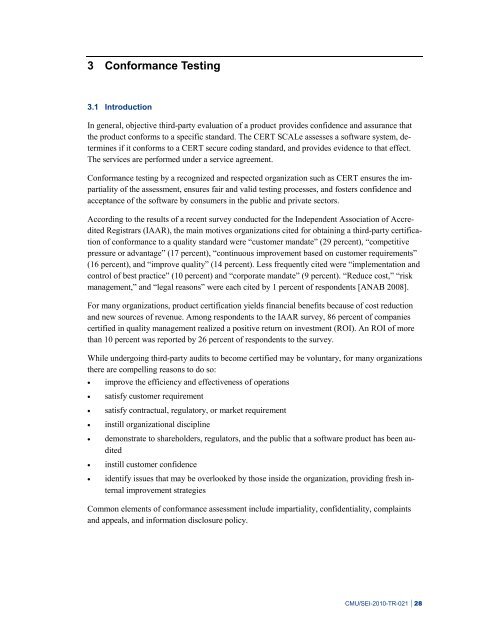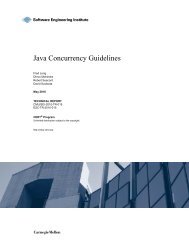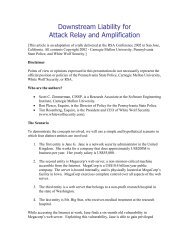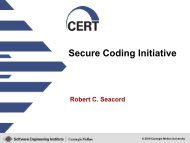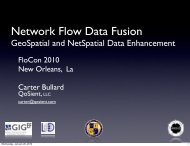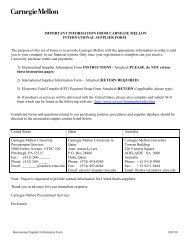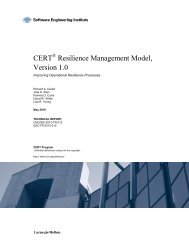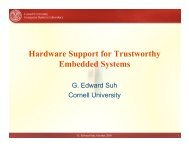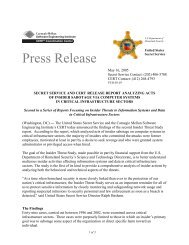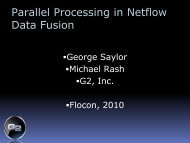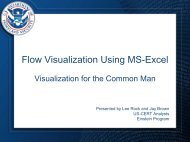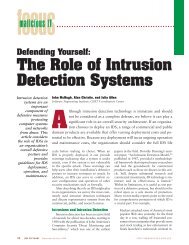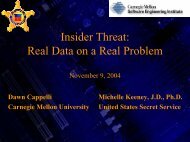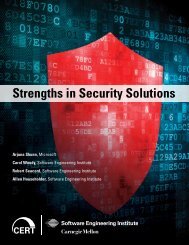Source Code Analysis Laboratory (SCALe) for Energy ... - CERT
Source Code Analysis Laboratory (SCALe) for Energy ... - CERT
Source Code Analysis Laboratory (SCALe) for Energy ... - CERT
Create successful ePaper yourself
Turn your PDF publications into a flip-book with our unique Google optimized e-Paper software.
3 Con<strong>for</strong>mance Testing<br />
3.1 Introduction<br />
In general, objective third-party evaluation of a product provides confidence and assurance that<br />
the product con<strong>for</strong>ms to a specific standard. The <strong>CERT</strong> <strong>SCALe</strong> assesses a software system, determines<br />
if it con<strong>for</strong>ms to a <strong>CERT</strong> secure coding standard, and provides evidence to that effect.<br />
The services are per<strong>for</strong>med under a service agreement.<br />
Con<strong>for</strong>mance testing by a recognized and respected organization such as <strong>CERT</strong> ensures the impartiality<br />
of the assessment, ensures fair and valid testing processes, and fosters confidence and<br />
acceptance of the software by consumers in the public and private sectors.<br />
According to the results of a recent survey conducted <strong>for</strong> the Independent Association of Accredited<br />
Registrars (IAAR), the main motives organizations cited <strong>for</strong> obtaining a third-party certification<br />
of con<strong>for</strong>mance to a quality standard were “customer mandate” (29 percent), “competitive<br />
pressure or advantage” (17 percent), “continuous improvement based on customer requirements”<br />
(16 percent), and “improve quality” (14 percent). Less frequently cited were “implementation and<br />
control of best practice” (10 percent) and “corporate mandate” (9 percent). “Reduce cost,” “risk<br />
management,” and “legal reasons” were each cited by 1 percent of respondents [ANAB 2008].<br />
For many organizations, product certification yields financial benefits because of cost reduction<br />
and new sources of revenue. Among respondents to the IAAR survey, 86 percent of companies<br />
certified in quality management realized a positive return on investment (ROI). An ROI of more<br />
than 10 percent was reported by 26 percent of respondents to the survey.<br />
While undergoing third-party audits to become certified may be voluntary, <strong>for</strong> many organizations<br />
there are compelling reasons to do so:<br />
• improve the efficiency and effectiveness of operations<br />
• satisfy customer requirement<br />
• satisfy contractual, regulatory, or market requirement<br />
• instill organizational discipline<br />
• demonstrate to shareholders, regulators, and the public that a software product has been audited<br />
• instill customer confidence<br />
• identify issues that may be overlooked by those inside the organization, providing fresh internal<br />
improvement strategies<br />
Common elements of con<strong>for</strong>mance assessment include impartiality, confidentiality, complaints<br />
and appeals, and in<strong>for</strong>mation disclosure policy.<br />
CMU/SEI-2010-TR-021 | 28


